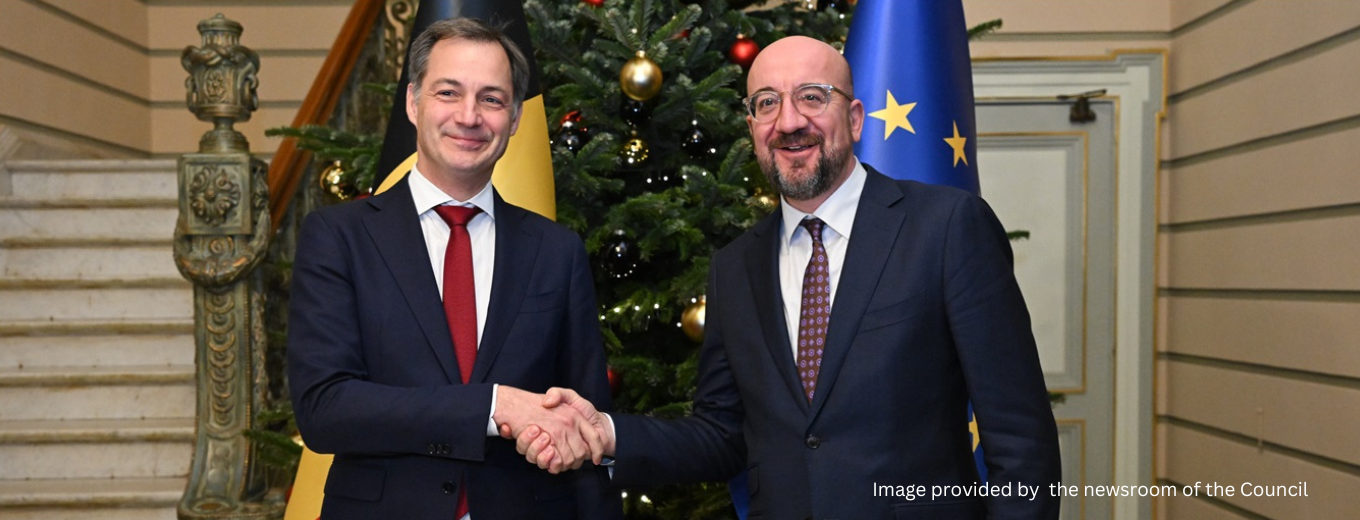Belgium will lead the EU during the first half of 2024. Next year will also see progress towards Swiss association to European Union programmes.
Belgium will take over the Presidency of the Council of the EU on 1 January 2024, following on Spain. Hungary will then complete the current Presidency trio in the second half of 2024. The coming year will be a year of transition for the EU with the European Parliament elections on 6-9 June 2024 and the appointment of a new European Commission (EC) in autumn. In addition to the EU Parliament elections, elections will also be held in Belgium on 9 June.
The Belgian Presidency programme includes three main priorities in the area of research and innovation: First, the incoming Presidency will stress the importance of R&I in strengthening “the European industry to achieve more open strategic autonomy in health, clean-tech, food, digitalisation, disruptive and key enabling technologies (KETs) ranging from AI, advanced materials to life-science technologies”. Second, Belgium wants to improve the valorisation of research results to reduce the innovation gap and to stimulate the EU’s recovery and revitalisation. There are Council Conclusions foreseen to achieve these objectives. Third, the Belgian Presidency plans to better connect science, industry, policy, and society. The goal of this initiative is “to help enhance trust and engagement in science and address key societal and environmental challenges”. Possible useful tools to achieve this include interdisciplinary evidence-informed policymaking and science communication. The incoming Presidency also views the mission model within Horizon Europe as guidance in this respect. Furthermore, Belgium plans to foster international cooperation based on openness, “while promoting a level playing field and reciprocity underpinned by fundamental principles and values in line with the Global Approach to Research and Innovation”. To support this, the Presidency will organise the informal ministerial meeting ‘Multilateral dialogue on principles and values for international cooperation in research & innovation’ on 15-16 February 2024 in Brussels. Other priorities focus on advancing R&I in the nuclear field e.g., finding solutions for high-level radioactive waste as well as stressing the significance of the ITER project. The next Presidency will also support policies for the development of radiological and nuclear technologies in healthcare, with a crucial role for the ‘Strategic Agenda for Medical Ionising Radiation Applications’ (SAMIRA Initiative).
The Belgian Presidency plans to work towards the achievement and further development of the European Education Area (EEA) by strengthening the strategic framework for European cooperation in education and training. Respective Council conclusions with a view to enhancing the quality and equity of education and training systems are foreseen. Furthermore, the new Presidency aims to ease mobility for all learners and educators and will to that end work on a Council recommendation aimed at updating the current EU learning mobility framework. Furthermore, Belgium plans to initiate discussions on the forthcoming higher education package focusing on the pathway towards joint European degrees, a European quality assurance and recognition system in higher education, and a European framework for attractive and sustainable careers in higher education. Other priorities will focus on addressing digital education and teacher shortages. Belgium will review and refine the EU Youth Strategy 2019-2027, including a Council resolution on youth work policy.
On 4 December 2023, the EU-UK Specialised Committee on Participation in Union programmes formalised the United Kingdom’s association to Horizon Europe by adopting a respective decision (see SwissCore article). The UK’s association will come into effect on 1 January 2024 (see Factsheet for guidance).
In the case of Switzerland, the Swiss government decided on 8 November 2023 to prepare a mandate for negotiations with the EU on a package of agreements, including association to Horizon Europe and Erasmus+ (see SwissCore article). On 15 December, the government approved the draft negotiation mandate for the package approach and published the Common Understanding reached with the EC. According to the latter, the EC would be ready to apply a transitional arrangement to Swiss applicants in the case of the ERC Advanced Grant call once the negotiations on the package of agreements have started (see link). The transitional arrangement is to be applied to all Horizon Europe and Euratom calls for proposals for the 2025 programme year, provided that a corresponding agreement between Switzerland and the EU has been initialled by then. Swiss applicants will be funded by Horizon Europe once Switzerland’s association takes effect (see also EU mandate proposal for negotiations with Switzerland and related Q&A).

